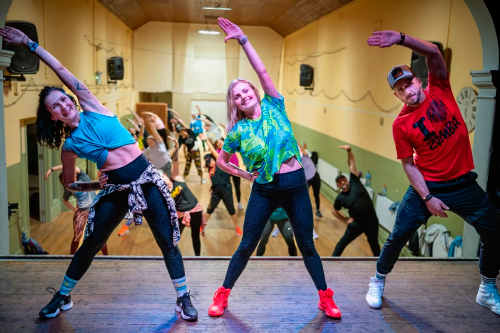Zumba classes create vibrant communities that extend far beyond exercise, offering participants valuable social connections, support networks, and shared experiences that enhance overall quality of life. The group fitness environment naturally fosters friendships while providing accountability and motivation that supports long-term fitness success.
Community Building Through Shared Experience
The collective energy of group Zumba classes creates bonds between participants who share the common experience of learning choreography, overcoming challenges, and celebrating achievements together. These shared experiences build lasting friendships that often extend beyond the fitness studio into other areas of life.
Mutual Support Systems: Regular class participants develop support networks that provide encouragement during difficult periods, celebrate successes, and maintain accountability for fitness goals. These relationships create powerful motivation systems that promote consistent participation and achievement.
Breaking Social Barriers
The inclusive, non-judgmental nature of Zumba classes helps break down social barriers that might exist outside the fitness environment. Participants from diverse backgrounds, ages, and experience levels unite through shared enjoyment of music and movement, creating opportunities for meaningful connections across traditional social boundaries.
Cultural Exchange: The international music selections in Zumba classes naturally promote cultural awareness and appreciation, with participants learning about different traditions while sharing their own cultural backgrounds in welcoming, curious environments.
Confidence Building Through Group Support
The supportive group atmosphere helps individuals build confidence in social situations while developing comfort with physical expression and creative movement. The encouraging environment helps participants overcome self-consciousness while building positive self-image through community acceptance and support.
Leadership Development: Advanced participants often have opportunities to mentor newcomers, assist instructors, or even lead warm-up sessions, developing leadership skills and confidence that transfer to other areas of personal and professional life.
Stress Relief Through Social Connection
The combination of physical activity, music, and social interaction provides powerful stress relief that individual workouts cannot match. The laughter, encouragement, and shared energy create therapeutic experiences that improve mental health while building resilience through community support.
Emotional Outlet: Group exercise provides healthy emotional outlets where participants can release stress, express themselves freely, and experience joy in supportive environments that validate feelings while promoting positive coping mechanisms.
Accountability and Motivation Networks
Regular class attendance creates natural accountability systems where participants notice when others are absent and provide encouragement for continued participation. This gentle peer pressure helps maintain consistency while building motivation through shared goals and mutual support.
Goal Achievement Celebration: The group environment provides natural opportunities to celebrate fitness milestones, weight loss achievements, and personal victories, creating positive reinforcement systems that maintain long-term motivation and commitment to health goals.
Intergenerational Connections
Zumba classes often attract participants across wide age ranges, creating opportunities for intergenerational friendships and learning experiences. Younger participants benefit from the wisdom and experience of older members, while older participants gain energy and fresh perspectives from younger classmates.
Mentorship Opportunities: The age diversity creates natural mentorship relationships where experienced participants guide newcomers while learning new approaches and perspectives from different generations in mutually beneficial exchanges.
Social Skills Development
Regular participation in group fitness classes helps develop social skills including communication, cooperation, and empathy through shared experiences and group interaction. These skills transfer to other social situations, improving overall social confidence and relationship-building abilities.
Conflict Resolution: The occasional challenges that arise in group settings provide opportunities to practice conflict resolution and cooperation skills in low-stakes environments that build capacity for handling social challenges in other life areas.
The social benefits of Zumba classes often prove as valuable as the physical fitness improvements, creating comprehensive wellness experiences that support mental health, social connection, and overall life satisfaction through meaningful community participation.



